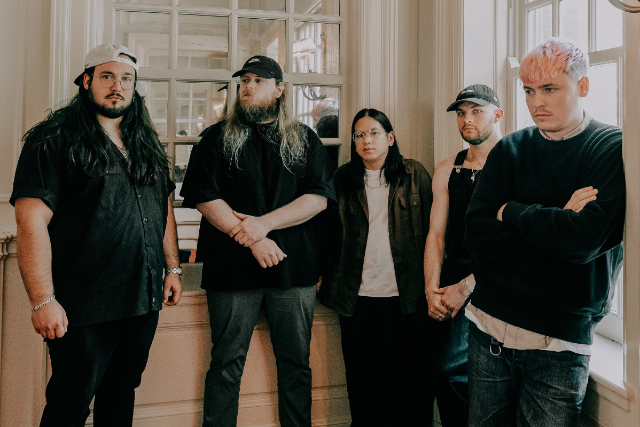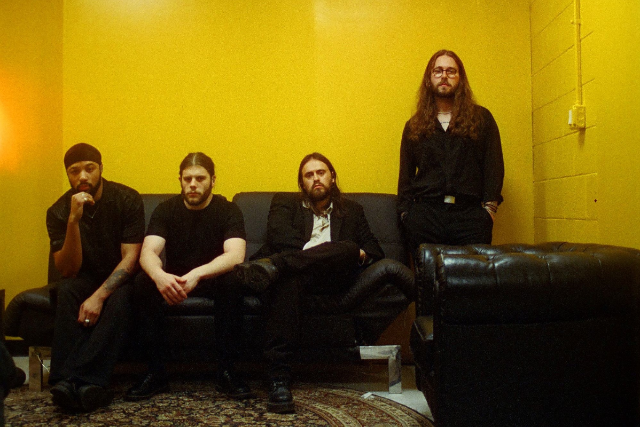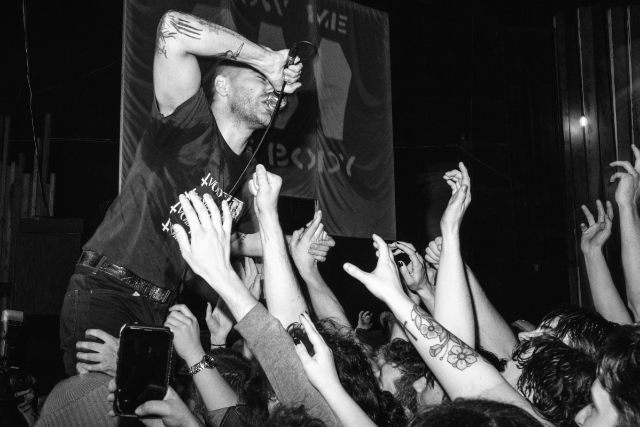About This Event
PLEASE NOTE - Marathon Music Works is a cashless venue. Only debit or credit cards are accepted at our bars, box office and guest services window. Please plan accordingly.
Need an Access Code? Sign up for our newsletter to get new show announcements, exclusive presale codes, rental discounts and more. Sign up HERE.
*Presale codes are usually sent out on Thursdays at 10am as part of our weekly newsletter.
Artist Info

A Tear expands on the narratives hinted at on A Different Shade of Blue, their highly lauded 2019 full-length that cemented them as one of heavy music’s most prominent acts. With quarantine upending their extensive touring schedule — “we’ve kind of been consistently on the road since 2014,” says Garris — the group found themselves in early 2020 sequestered near their hometown of Louisville, in Oldham County, Kentucky. By June, they were hunkered down in a cabin in Pigeon
Forge, Tennessee, focused on writing a concept album. By the end of September they had finished recording A Tear in the Fabric of Life.
Musically, the songs were written in order and speak to each other. On the opener, “Where Light Divides the Holler,” ambient sounds of a radio switching give way to a harsh, punishing breakdown. “Permanent,” the closer, is crushing, and ends in a majestic, almost soundtrack-like ring-out. In between there are new elements — guitars droning out, radio interludes, vocal-only suites — and the immediate heaviness listeners have come to expect from Knocked Loose. It’s
hardcore, filtered through what Garris says is a more prominent death metal influence. The new sounds the band never tried before have the goal, guitarist Isaac Hale says, of making everything sound “more extreme and more abrasive.”
Which is saying something. Young, but accomplished — along with Garris and Hale, there’s Kevin Otten (bass) and Kevin “Pacsun” Kaine (drums), everyone in their mid to late twenties — the band’s been trading on heaviness for a while. “We’ve written a lot of songs,” says Hale, “and a lot of breakdowns.” Their discography — along with Blue, there’s Laugh Tracks, from 2016, both on Pure Noise, as well as a demo and a handful of singles — is full of them. Every record up to A Tear has been very much hardcore, building off its predecessor, adding some metal and higher emotional stakes. More growth means more heaviness. Says Hale, “nothing gets taken away.”
So too with A Tear, which is a massive progression, but not a departure. The end result feels like a stress test: six songs that speak to each other in a language that’s equal parts Phil Spector and death metal and that balance the tension between technical mastery and catchiness. This is Knocked Loose, distilled, and taking a leap.

Debut full-length The Cold Sun was a heady hybrid of meaty down-tuned riffs, lacerating screams and pile-driving rhythms. I Let It In and It Took Everything retains those elements, albeit delivered with a searing potency and sharpened focus that bests its predecessor in almost every conceivable way. Rather than existing within one style or taking one approach, Loathe pepper their music with a range of influences and musical motifs that move fluidly and give the Liverpool quintet a dynamism that was merely hinted at before. Their palette has widened significantly and surprises are plentiful; shimmering guitars, layered synths, unhinged guitar effects, a stronger emphasis on ethereal clean vocals and even elements that echo the sheer sonic brutality that epitomises black metal.
It all adds up to a release that is dynamic in extremis and yet remarkably cohesive as guitarist Erik Bickerstaffe attests. ‘I always want Loathe to be eclectic, a monster with many different faces but to make sure that it all sits in the same universe as well.’
A myriad of different influences are being thrown into the Loathe melting pot, some that people might expect and others that would likely seem inconceivable for a band with such an acerbic sound. Both Radiohead and The 1975 are cornerstones in the approach Loathe take with their music, partly in a sonic sense but mainly in terms of being a band who strive to do whatever they want and cultivate a fan base that will follow them down some deep, experimental rabbit holes. ‘We did a lot of what we wanted to do on The Cold Sun but there were some instruments that weren’t at our disposal,’ Erik continues. ‘But I feel like we've ventured into different areas with this one. There's so much more singing and there's much more what I would call ‘traditional’ song-writing. We never want to abandon the crazy, sporadic metal side of the band, we just want all these other ideas to take root so that it furthers the lore of the band. I want us to be seen as this huge machine that can do whatever it needs or wants essentially.’
And then there are specific influences that stem from outside of music as well; the soundtrack to 2001’s survival horror videogame Silent Hill 2, the ominous, disturbing aura created by 2019’s most divisive film Joker or the entire works of serial brain scrambler David Lynch. That sense of distressing, Lynchian esotericism is the territory Loathe are intent on occupying, a world where nothing is quite as it seems, curiosity is rewarded and nothing is laid out in black and white. It’s not the easiest path to take, but then few paths worth taking are the easiest to traverse, an attitude boldly summed up in that arcane title, I Let It In and It Took Everything. ‘The idea of what we are doing and the recording of the album is ‘it’’ Erik explains. ‘We let in the idea of being in this band, and it took everything from us. Without trying to make it sound like a sob story, we needed to build ourselves up again in order to make this record.’
The likes of Aggressive Evolution and New Faces in the Dark will be familiar to those already acquainted with the band’s dizzying hybrid of industrial bluster and hardcore energy. But the process of re-building themselves really starts to show itself on the expansive, lush instrumentation of Two-Way Mirror or A Sad Cartoon, songs that feel like a new string to add to Loathe’s burgeoning bow. Red Room is a short, sharp burst of adrenalized noise-core whilst Heavy is the Head That Falls with the Weight of a Thousand Thoughts features an abrasive incandescent performance from vocalist Kadeem France that has to be heard to be believed. It seems Loathe’s desire to never be pigeon-holed is as strong as it’s ever been. I Let It In and It Took Everything opens up Loathe’s horizons and proves that they can sound however they want to sound. ‘We're not here to add to someone else's legacy,’ says Erik. ‘We're trying to create our own.’

Trouble the Water both references and pays homage to the physical city, and the New York Sound: not one particular genre, but the people and subcultures that encapsulate it’s true foundation, style, and spirit; while expanding upon and reckoning with the hyperlocal territory of 2019’s Dog Whistle. With Pratt’s most encantatory, interrogative poetry to date, and Steed expanding the glitchy, caustic arena of his electronic experimentation, the band is feeling more like themselves than ever. The founding duo, who have worked together since 2009, used Trouble The Water to methodically inhabit one another’s forms; Pratt experimented recklessly with production and synths, while Steed challenged his own focus to include melodies and riffs.
Although the title invokes the ancient alchemy Moses wielded to free and unite Israelite peoples, Trouble The Water refuses nostalgia, or mimicry. Instead, it considers the sublime power of the unifying physical practices that can be enacted daily, to invoke immeasurable spiritual and collective reactions. Buoyed by moments of stinging stillness and compulsive, almost optimistic, malfunctioning rhythms, the work is literally a conjuration to dance, and move.
If we are really living through the end of the world, maybe every movement we make, no matter how slight, is actually boundless and radical. How do we find freedom through rejecting time altogether, and existing only in communion, in space, and in the constellations we form as we choose our “blood” families? Or, as Pratt demands on Demeanor, “What’s better than when we come together? Fighting, dancing, fucking together.” Trouble the Water is at once a homily for those left behind or displaced, and a searing investigation of what survival looks like from within the borders of an aggressively policed city and state, that postures those unignorable calls for rage and migration to a world at war.
Bandmate and long-time music inspiration Jackie McDermott (Sediment Club, Urochromes), joined Show Me the Body in 2020 as drummer, and is featured on the project. Trouble The Water was recorded entirely at the band’s CORPUS Studios in Long Island City, with veteran metal producer Arthur Rizik, and co-engineered by studio co-founder Aidan Bradley.
Dog Whistle (2019) was produced by Chris Coady, Show Me The Body and Gabriel Millman. The heavy, honest project was in direct conversation with the oppressive, claustrophobic psychology of the city, andtheir most critically-acclaimed work to date, described by NME as “a dedication to the community, friends and family at the heart of Show Me The Body” coupled with “the jarring noise and harsh sonics that made [SMTB] one of punk’s most idiosyncratic voices.” Dog Whistle followed Show Me The Body's now historic, genre-defying debut album Body War (2016).
Since 2015, Show Me the Body have expanded their international music community into an independent label, recording studio, and community organizing platform. The band recently completed their Half-A-USA tour with support from Soul Glo and WiFiGawd, which included their inaugural In Broad Daylight festivals in New York and Los Angeles. Through the intentional cultivation of their local and global chosen families, and a decade-long dedication to sustaining the New York Sound, Show Me the Body has solidified a legacy of confronting and permanently shifting the rigid limitations of the hardcore genre.
